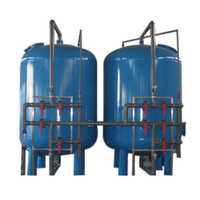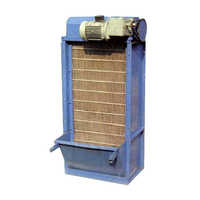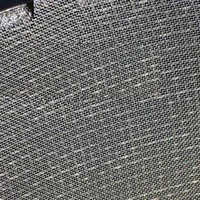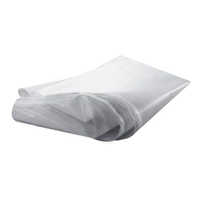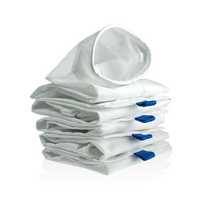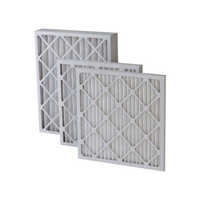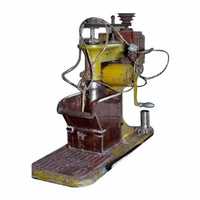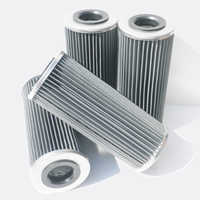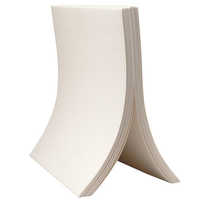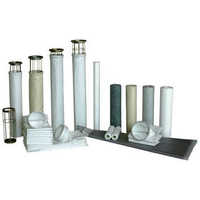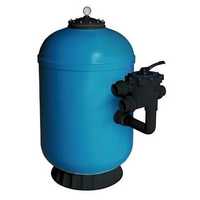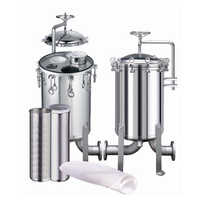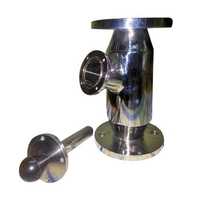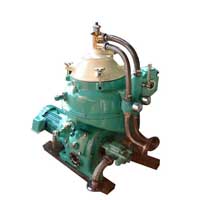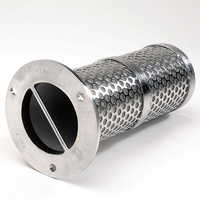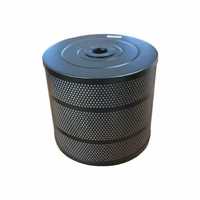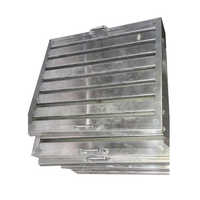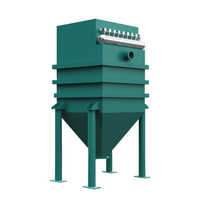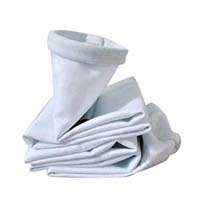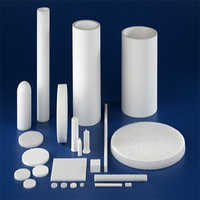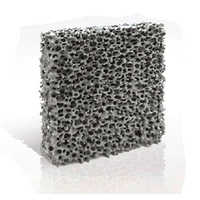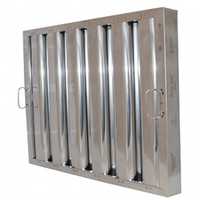Filter Cloth, Filter Industrial
(4823 products)
Access a comprehensive database of global and Indian manufacturers, exporters & suppliers of Filter Cloth, Industrial Filters. View product & contact details of listed Filter Cloth, Industrial Filters sellers with ease, select the companies and send them your requirements directly.
Explore More Categories
Made in India
Bag Filter
Price: 250 INR (Approx.)/Piece
MOQ - 10 Piece/Pieces
10 Years
Response Rate: 100.00%
Business Type: Manufacturer | Distributor
ANGEL CHEMICALS PRIVATE LIMITED
Indian Inquiries Only
Pleated Filter Bag Application: Dust Control
Price Trend: 5000.00 - 10000.00 INR (Approx.)/Piece
MOQ - 5 Piece/Pieces
Weight - 2-5 Kilograms (kg)
Efficiency (%) - 99.9%
Color - Black, white and Yellow
14 Years
Business Type: Manufacturer | Exporter
R+B FILTER MANUFACTURING ENTERPRISES PVT. LTD.
Made in India
Trickling Filter And SAFF Media
MOQ - 100 Cubic Meter/Cubic Meters
6 Years
Business Type: Manufacturer | Exporter
COOLDECK INDUSTRIES PVT. LTD.
Made in India
Gray Industrial Dual Media Filter
Price: 80000 INR (Approx.)/Unit
MOQ - 1 Unit/Units
Color - Gray
Product Type - Dual Media Filter
Material - Stainless Steel
4 Years
Business Type: Manufacturer | Exporter
INHIBEO WATER SOLUTION & TECHNOLOGIES PVT. LTD.
Bag Filter System
Price: 200000 INR (Approx.)/Piece
MOQ - 1 Piece/Pieces
Product Type - Bag Filter System
Usage - Food Industry
Color - Grey
2 Years
Business Type: Manufacturer
PARUL ENGINEERING PRIVATE LIMITED
Made in India
White Suction Air Filter Media
Price Trend: 1000.00 - 10000.00 INR (Approx.)/Unit
MOQ - 1 Unit/Units
Product Type - Suction Air Filter Media
Color - White
Usage - Industrial
16 Years
Business Type: Manufacturer | Distributor
TFI FILTRATION (INDIA) PVT. LTD.
Made in India
Combination Grilles With Filter Frame
15 Years
Business Type: Manufacturer | Distributor
REVLON INDUSTRIES
Made in India
Carbon Steel Cartridge Filters
Price: 100000 INR (Approx.)/Unit
MOQ - 1 Unit/Units
Material - Carbon Steel
21 Years
Business Type: Manufacturer | Exporter
SUNRISE PROCESS EQUIPMENTS PRIVATE LIMITED
Made in India
Industrial Liquid Filter
Price Trend: 15000.00 - 50000.00 INR (Approx.)/Piece
MOQ - 1 Piece/Pieces
6 Years
Business Type: Manufacturer | Exporter
GTS FILTERS AND SYSTEMS (INDIA) PRIVATE LIMITED
Made in India
Electroplating Chemical Filter
Price: 22000 INR (Approx.)/Piece
MOQ - 1 Piece/Pieces
15 Years
Business Type: Manufacturer | Exporter
FINE RHODIUM
AIRLINE FILTERS
16 Years
Business Type: Manufacturer | Distributor
BLASTECH
Indian Inquiries Only
Made in India
Irrigation Media Filter
Price Trend: 4000-200000 INR (Approx.)/Piece
MOQ - 1 Piece/Pieces
4 Years
Business Type: Manufacturer | Exporter
SHALIN COMPOSITES (INDIA) PRIVATE LIMITED
Made in India
Different Available Filter Disc
21 Years
Business Type: Manufacturer | Distributor
INTERNATIONAL WIRENETTING INDUSTRIES
Made in India
Industrial Grade White Bag Filter
Price: 360.00 INR (Approx.)/Piece
MOQ - 5 Piece/Pieces
Size - Comes in various sizes
Color - White
Application - Industrial
12 Years
Business Type: Manufacturer | Supplier
TRINITY FILTRATION TECHNOLOGIES PVT. LTD.
Made in India
Filter Bags
Price Trend: 200.00 - 400.00 INR (Approx.)/Piece
MOQ - 50 Piece/Pieces
20 Years
Business Type: Manufacturer
KALBAG FILTERS PVT. LTD.
Indian Inquiries Only
Made in India
Bag Filters
8 Years
Business Type: Manufacturer | Supplier
MICROTECH BOILERS PRIVATE LIMITED
Made in India
Integrative Pool Filter System
11 Years
Business Type: Manufacturer | Distributor
D S WATER TECHNOLOGY
Made in India
Cartridge Filters
16 Years
Business Type: Manufacturer | Exporter
ASCENT MACHINERIES & ENGG. SERVICES
Made in India
High Grade Inline Filters
8 Years
Business Type: Manufacturer | Distributor
Excel Filtration Pvt. Ltd.
Made in India
Filter Bag
9 Years
Business Type: Manufacturer | Distributor
SHEETAL ENTERPRISES
Made in India
Absorbent Mat Roll in Dispenser Box
7 Years
Business Type: Manufacturer | Distributor
ATLANTIC MARITIME SERVICES PVT. LTD.
Made in India
Bag Filters
4 Years
Business Type: Exporter
SUNIT CONCRANES PRIVATE LIMITED
Square Hvac Pre Filter
Price Trend: 1000.00 - 10000.00 INR (Approx.)/Piece
MOQ - 10 Piece/Pieces
Product Type - HVAC PRE Filter
Usage - Industrial
Condition - New
10 Years
Business Type: Manufacturer
UNITED FILTERS INDUSTRIES PVT LTD.
Made in India
Megalam Es Fabsafe Cleanroom Panel Application: Industrial
Price Trend: 100.00 - 1000.00 INR (Approx.)/Kilograms
MOQ - 50 Kilograms/Kilograms
Product Type - Cleanroom Panel
Application - Industrial
5 Years
Business Type: Manufacturer | Distributor
RBM GREEN AIRFIL
Made in India
Filter Cloth
2 Years
Business Type: Manufacturer | Distributor
TIMES FIBREFILL PVT. LTD.
High Pressure Line Filters Usage: Personal Care
Material - CS
Efficiency - High
13 Years
Business Type: Distributor | Exporter
VNM HYDROTEK
Made in India
Mini Pleat Hepa Filters
Price Trend: 1800.00 - 2400.00 INR (Approx.)/, Square Meter
MOQ - 500 , Square Meter/Square Meters
12 Years
Business Type: Manufacturer | Exporter
SRPREFABS MODULAR CLEANROOM PVT. LTD.
Bag Filter Cages Application: Dust Collector
Usage - Industrial
Product Type - Bag Filter Cages
Color - White
15 Years
Business Type: Manufacturer | Supplier
HRI ENGINEERING COMPANY
Filter Cloth, Filter Industrial Manufacturers | Suppliers in India
| Company Name | Location | Member Since |
|---|---|---|
| Sunrise Process Equipments Private Limited | Mumbai, India | 21 Years |
| International Wirenetting Industries | Palghar, India | 21 Years |
| Kalbag Filters Pvt. Ltd. | Chinchwad, India | 20 Years |
| Tfi Filtration (India) Pvt. Ltd. | Ahmedabad, India | 16 Years |
| Blastech | Mumbai, India | 16 Years |
| Ascent Machineries & Engg. Services | Mumbai, India | 16 Years |
| Revlon Industries | Ahmedabad, India | 15 Years |
| Fine Rhodium | Mumbai, India | 15 Years |
| Hri Engineering Company | Gurugram, India | 15 Years |
| R+B Filter Manufacturing Enterprises Pvt. Ltd. | Vadodara, India | 14 Years |
What are Filter Cloth & Industrial Filters?
Introduction
Filter clothes used in the industrial sector are woven from a variety of filter materials using intricate weaving techniques.
Materials are selected with consideration for the surrounding chemical and thermal conditions. Filtration quality, mechanical resistance, and anti-adhesion properties in the filter cake discharge were all taken into account when deciding on the weave type.
Monofil, mutifil, and staple fiber yarns are only a few of the many varieties available. You may also create a complex weave by combining different kinds of yarn.
Particles in the air and other gases are filtered out in factories using specialized equipment. Air filtration and separation systems are essential in many industrial operations for the sake of worker safety and the preservation of expensive machinery.
Benefits of Filter Cloth & Industrial Filters
Numerous sectors rely on filtration equipment for various purposes. The filter cloth has many uses, including purifying water, minimizing airborne dust emissions, filtering food, and even distilling blood plasma. Companies that make and sell filtration supplies including filter clothes filter cages, and filter bags help other businesses that rely on effective filtration to function normally. Here are the benefits of filter cloth and Industrial filters:
-The use of gravity and low head loss in filtration
-Filtration occurring in real-time without the need for periodic back washing or pauses
-Filter cloth made of synthetic fibers that have been treated to provide great mechanical strength and freedom from harmful chemicals
-Discharge TSS values less than 5 mg/l indicate a highly efficient filtration system.
-Very low-power consumption cloth backwash
-Elimination of Air and Noise Pollution
-Capability of adjusting to changing input conditions and a degree of resilience to overload
-Dimensional Minimalism
-Small amounts of water used for backwashing
-Excellent efficiency in dust capture, both coarse and fine;
-Both pressure drop and effectiveness are insensitive to changes in load;
-In some cases, the dust collected can be recycled for use in the procedure;
-Concentrations entering the system are what ultimately influence residual emissions;
-Very simple in operation
-Monobloc and concrete tank versions are both user-friendly.
-Infrequent upkeep
-The convenience of having immediate access to all services
-Impact on the environment is minimal.
Material Used in Filter Cloth & Industrial Filters
Nylon, polyester, polypropylene, and even more complex and pricey materials like PPS, E-CTFE, PEEK, and PTFE can all be found among synthetic filter textiles.
Many different kinds of fabrics can be used to make filter clothes. Even though some uses still exist for natural fibers, synthetic materials are typically employed to make filter cloth today.
All of the various synthetic materials have a price, which might range from 1 to 100. Therefore, it is crucial to aim the filtration rating and all of the ancillary factors such as pressure, PH, flow rate, mechanical resistance, temperature, budget, etc. as precisely as possible for each application.
Steel and stainless steel are still utilized, but only for highly specific molding uses or massive screen filtering. Stainless steel Filter Cloth, Filter Industrial is not always mechanically better than synthetic clothes, contrary to common opinion. This depends on the filtration rating.
1. Nylon Filter Cloth
Nylon filter cloth is well-praised for its effectiveness against adhesion and moisture retention in both extreme conditions and everyday use.
2. Polypropylene Filter Cloth
It's no secret that polypropylene cloth is the go-to material for filtering in the industrial sector. The corrosion resistance of this material is legendary.
3. Polyester Filter Cloth
The polyester fibers in filter cloth are what give it its great resistance to acids and mechanical strength. Useful for making filter press clothes, filter belts, or filter bags
4. Filter Cloth made of PEEK, PVDF, and PTFE
Users frequently express their appreciation for fluoropolymer filter clothes like PVDF and PTFE, yet these materials are infrequently employed. The high cost of raw materials and the complexity of the production process are the primary reasons behind this. PTFE or PEEK Teflon-type fibers are still only used in high-stakes situations due to their exceptional chemical resistance, thermal tolerance, and very good cleaning capabilities.
5. Cotton Filter Cloth
Filter cages of this sort have several applications in the manufacturing sector. Filter cages made of cotton are extremely common. Sheets for hotels, tarps, tents, and military outfits are just some of the many products that benefit from this versatile fabric. Bandages, gauze, and cotton wool are all common medical devices that rely on them to staunch bleeding.
6. Vinylon Filter Cloth
Polyvinyl alcohol is the chemical term for the vinylon filter cloth. Its wear resistance is better and its longevity is 1-2 times that of pure cotton, but its strength is lower than that of polyester, its elasticity is weak, and the fabric does not retain its shape well.
It's impervious to the effects of alkalis and absorbs and releases moisture effectively. It combines well with rubber and is simple to do so. The rubber sector would benefit from this substance.
Types of Filter Cloth & Industrial Filters
Yarn-Based Filter Cloth Types:
1. Spun Yarn
Staple (spun) yarn is made by twisting together multiple strands of short natural or synthetic fiber. This thread has the properties of good particle holding and high sealing performance when woven into filter fabric.
2. Multifilament Yarn
Two or more monofilament yarns are spliced together to create a multifilament yarn. High tensile strength, good cake release, and particle retention are some of the features of filter cloth produced from this yarn.
3. Monofilament Yarn
Synthetic monofilament yarn consists of a single, unbroken filament. Woven from monofilament yarn, the filter cloth has the qualities of being resistant to blocking, allowing for smooth cake release and effective particle retention.
Weave-based Filter Cloth & Industrial Filter Types:
1. Satin Weave
There are more than 5 parallel warp and weft threads in a satin weave. This type of weave is characterized by its discontinuous weaving points. Many of the warp or weft threads are free to float on the fabric's surface, making it an excellent dust barrier.
Satin weave has fewer weaving points than plain and twill, allowing for better air permeability, but more yarns float freely on the fabric's surface, making it more vulnerable to damage.
2. Twill Weave
The twill construction consists of more than three parallel warp and weft strands. On the fabric, we can see slanted lines. Filter bags are often made of twill. Points in twill weaving are fewer than in straight weaving.
The filter cake release efficiency will be greater than that of plain lines due to the greater porosity and improved permeability.
3. Plain Weave
When it comes to fabric weaves, the most frequent and affordable option is plain weave. With just two warp and two weft threads, you may create a whole plain weave cycle.
Despite the relative stability, there are a lot of simple weave spots that have little porosity. Plain weave filter fabric has a low filtration rate because of its low permeability.
FAQs: Filter Cloth & Industrial Filters
Q. What are the applications of filter cloth & industrial filters?
Ans. These are some common applications for filter cloth & Industrial filters;
a- Ceramics
b- Food Industries
c- Dust Collectors
d- Geotextiles
e- Vehicles
f- Chemicals
g- Board Mills
h- Shopping bags
i- Water filters
j- Pharmaceuticals
k- Paper industries and more
Q. What is filter cloth fabric usually made of?
Ans. The Filter cloth fabric is made from Nylon, Polypropylene, Polyester, Cotton, Polyamide, and Polyethylene along with highly advanced techniques.
Q. How do I choose a filter cloth & industrial filters?
Ans. Here is the guide:
a- It's important to use the right filter fabric for the level of acidity or alkalinity in your solution.
b- When it comes to filtering press efficiency, temperature is a crucial influence. The polyester filter cloth can withstand the highest heat levels.
c- The filtrate will readily leach out of the filter cloth due to the smooth and nonsticky surface of the filter cake. Filter cloth options include single silk and satin.
d- Whether or not the particles are consistent in size and shape can affect the filter cloth's wear resistance.
Q. How much does a filter cloth & industrial filters cost?
Ans. The cost of filter cloth & Industrial filters would be between Rs 100- 4,000 meters in India.
Related Categories
Abrasives
Acoustic Products
Acrylic Sheets
Air Blowers
Air Compressors & Air Separation Plants
Air Cooler
Air Dryers
Air Receiver
Air Valves
Aluminum Castings
Anchors
Anti Vibration Mounts
Ball & Roller Bearings
Ball Valves
Ballast Making Machines
Bearing Parts & Components
Bearings
Bellows & Expansion Joints
Belt Pulleys
Boilers, Components & Spares
Bolts
Bright Bars
Bristles
Burners/Industrial Burners & Incinerators
Bushings & Bushing Parts
Butterfly Valves
CNC Machined Components
Cable Pulleys
Capital Goods
Carbon & Graphite Products
Castor Wheels
Centrifugal Pumps
Centrifuges
Ceramics
Chains & Chain Link Fence Fittings
Cleaning Equipment
Clips, Clamps
Coils
Combustion Equipment
Compression Springs
Compressors & Allied Equipment
Control Valves
Conveyor & Conveyor/Industrial Belts
Cooling Tower & Chilling Plants
Corrosion Protection Materials
Coupling
Cranes
Cryogenic Equipment
Cutting Tools, Broaches & Cutters
Departmental Shelving
Diaphragm Valves
Die Castings
Dies & Moulds
Dies,Jigs,Fixtures
Diesel Engine & Electric Locomotive Spares
Draught Fan
EOT Cranes
Electric Hoists
Electric Motors & Engines
Electroplating Chemicals & Equipment
Elevators, Lifts & Escalators
Energy Management System
Engine Valves
Engineering Goods & Equipment
Engineering Plastics
Engraving Equipment
Extruded Profiles
Fasteners
Fiberglass Products
Filter Cartridges & Media
Filter Cloth, Filter Industrial
Filters-Air, Gas, Liquid
Filtration & Sedimentation Units
Flat Metal Processing Equipment
Float Valves
Fork Lift Truck Parts
Fork Lift Trucks
Forklifts
Foundry Raw Material & Equipment
Furnace Manufacturers
Galvanized Fasteners
Gantry Cranes
Gaskets
Gate Valves
Gauges & Gauge Glasses
Gear Boxes, Reduction Gears & Gear Cutting
Girder Cranes
Glass & Glass Products
Glass Cutting Tools/Glass Cutters
Globe Valves
Goliath Cranes
Grating
Hand & Allied Tools
Hand Pump
Hardware & Tools
Heat Exchangers
Heating Elements
Hex Bolts
Hex Nuts
Hooks & Mounts
Hoses
Hot Air Oven
Humidification & Ventilation Equipment
Hydraulic Hoses & Flexible Metal
Hydraulic Press
Hydraulic Press Brakes
Hydraulic Products & Equipment
Hydraulic Valves
Induction Heating Equipment
Industrial Automation
Industrial Brakes
Industrial Brushes
Industrial Clothing
Industrial Clutches
Industrial Cylinders
Industrial Dryers
Industrial Evaporators
Industrial Knives
Industrial Nets
Industrial Ovens
Industrial Rollers
Industrial Supplies Stocks
Industrial Supplies-General
Industrial Tape
Industrial Tools
Industrial Valves
Industrial Vibrator
Inspection Equipment
Instrumentation
Internal Combustion Engine
Jib Cranes
Laboratory Furniture
Laboratory Glassware & Equipment
Laundry Equipment
Lined Valves
Machine Tools Accessories
Marking Systems
Material Handling Equipment
Measuring Tools & Equipment
Mechanical Seals
Metallised Capacitor Films
Mining Equipment
Mining, Exploration & Drilling Machinery
Model Making Materials
Motor Couplings
Moulded Components
Moulds
Needle Valves
Needles
Nuts
Oil Seals
Outdoor Cooling Systems
Overhead Cranes
PVC Hoses
PVC Products
Paint Brushes
Painting Equipments & Maintenance
Perforated Sheets
Plastic Processing Machinery Parts
Plastic Valves
Plastic Welding Equipment
Plate Valves
Plug Valves
Pneumatic Products & Tools
Pneumatic Valves
Polish & Polishing Material/Machinery
Power Press
Precision Brass Components
Pressed Components
Pressure Gauges
Pressure Vessels
Pulleys
Pulverizers
Pump Spares Parts
Pumps & Pumping Equipment
Radiators
Refrigeration & Equipment
Rope Pulleys
Rope,Twines & Webbings
Ropes
Rotary Valves
Rubber & Rubber Products
Rubber Gaskets
Rubber Roller
Rubber Seals
Rubber Transmission Belts
Screws
Seals
Sensors & Transducers
Shaft Couplings
Shafts & Shaft Collars
Sheet Metal Components & Parts
Solenoid Valves
Springs
Stainless Steel Bolts
Stainless Steel Fasteners
Stainless Steel Nuts
Stainless Steel Valves
Storage Systems
Storage Tanks
Submersible Pumps
Surface Finishing Equipment
Synthetic Industrial Diamonds
Testing & Measuring Equipment
Thermostatic Bimetals & Thermostats
Trolleys & Carts
Tungsten Carbide
Ultrasonic Equipment
V-Belts
Vacuum Equipment & System
Valves
Valves Fittings
Vibrating Screen
Washers
Water Coolers
Weighbridge
Welding & Soldering Supplies
Welding Electrodes
Welding Equipment
Winches
Wire Drawing Dies
Wire Rope Hoists
Wire Ropes
